A simple and easy recipe for soft, light, and fluffy pumpkin dinner rolls with homemade pumpkin purée. You’ll need just a handful of ingredients!
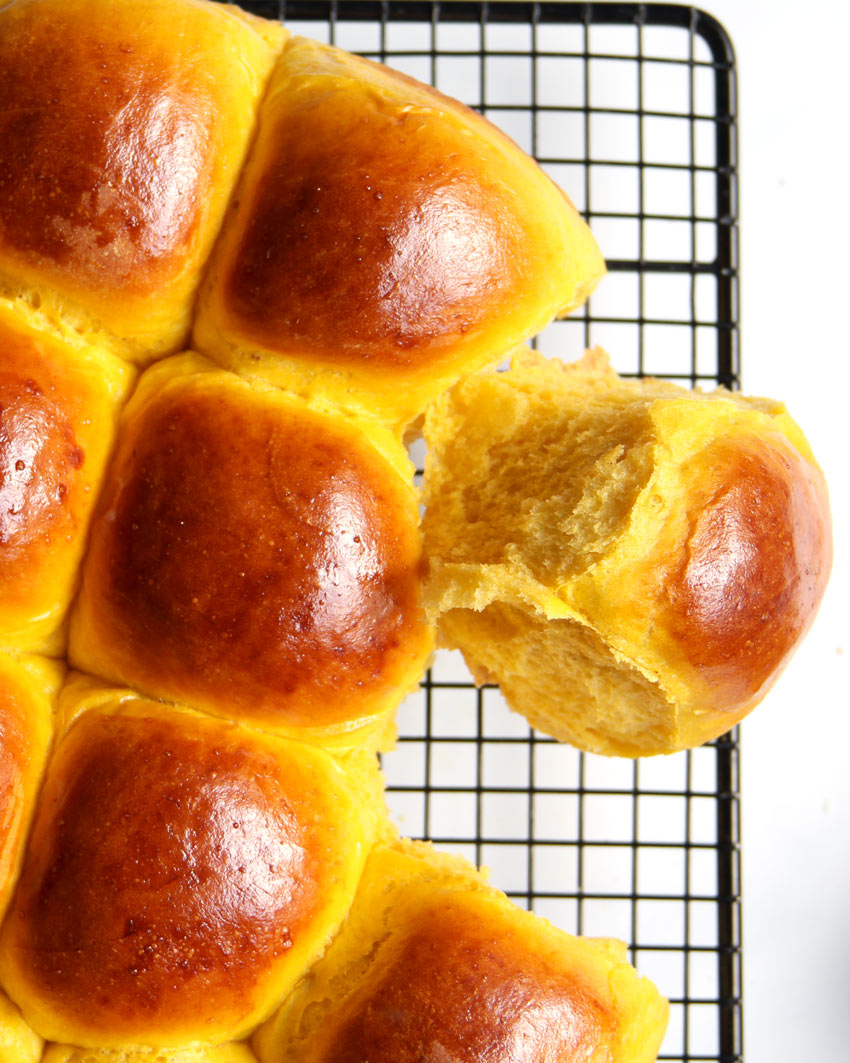
These golden rolls are delicately sweet and the perfect addition to your holiday gathering or any special occasion. Think Sunday brunch, Thanksgiving or Christmas dinner. They taste great on their own or served with your meal. I also love them for breakfast with salted butter.
For me, freshly baked dinner rolls are often times more intriguing than the main dish itself. Put a basket of these freshly baked pumpkin dinner rolls on the table and be sure that they are wiped out in no time.
With this recipe, you can make homemade dinner rolls for your next Sunday dinner or holiday gathering.
Golden rolls with pumpkin purée
Pumpkin purée is the secret to these soft and fluffy rolls. If you’re bored with plain rolls try these gorgeous orange-hued rolls instead. The pumpkin purée adds a touch of nuttiness and sweetness. That’s why I only add 1 tablespoon of sugar!
I’ll make the pumpkin purée on the stove-top, cooking the pumpkin with a bit of water in a saucepan until soft, for about 20 minutes. But if you want to take a shortcut, simply use plain canned pumpkin purée.
I do not add any pumpkin spices to the dough for a pure and subtle pumpkin flavor. I rather save the pumpkin spice-mix for pumpkin pie.
If you prefer dinner rolls without pumkin, try these dinner rolls with brown butter and sage. I love them too!
Recipe pumpkin dinner rolls
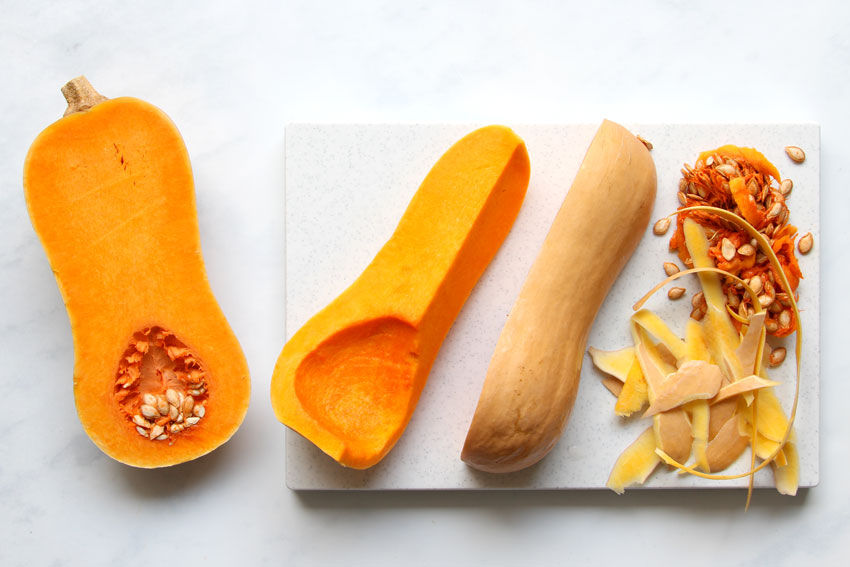
For the homemade pumpkin purée, cut the pumpkin in half, and scoop out the seeds and the stringy pulp. Peel and chop pumpkin into 1-1.5 inch (or 2-3 cm) pieces.
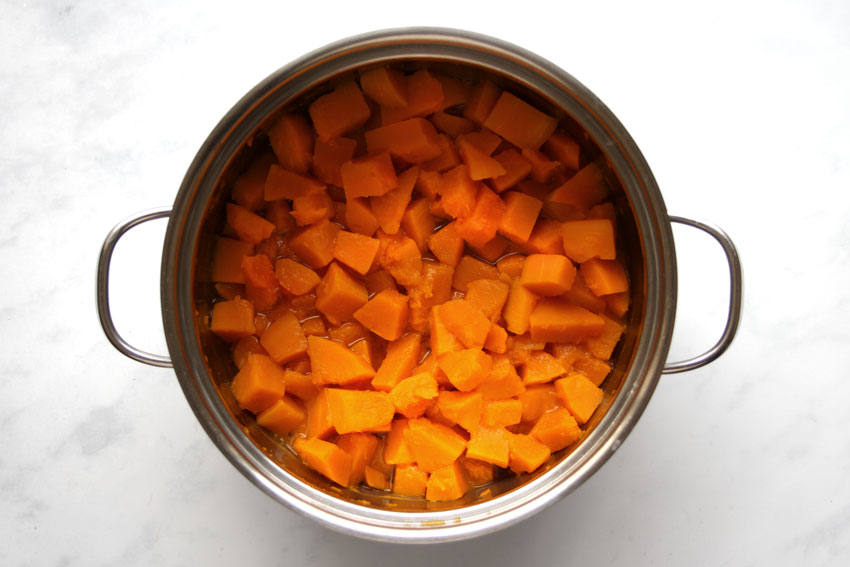
Add enough water to cover the bottom of a large saucepan by 1-inch (2-3 cm). Add chopped pumpkin into the saucepan and cook covered over low heat until tender, about 20 minutes. Alternatively, you can steam the pumpkin until soft using a steamer basket.
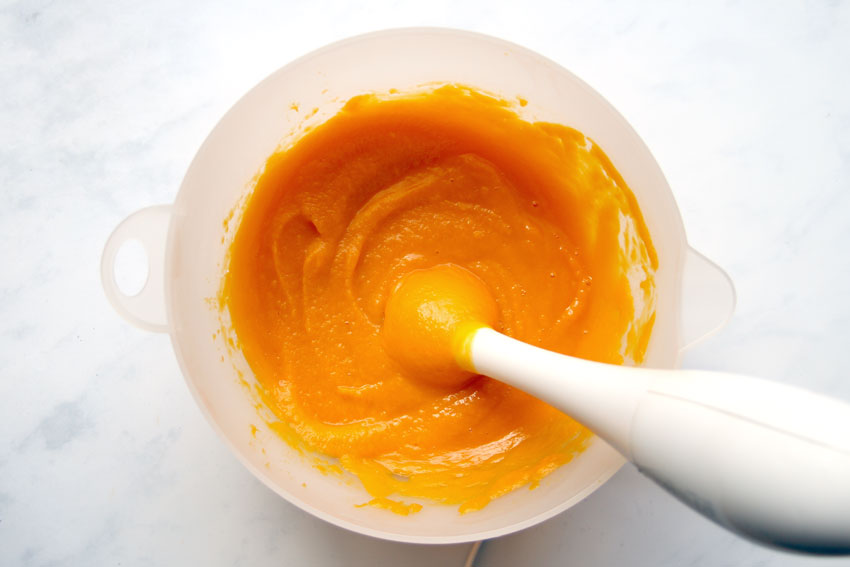
Drain pumpkin and blend until smooth using a food processor or hand blender. Let cool slightly.
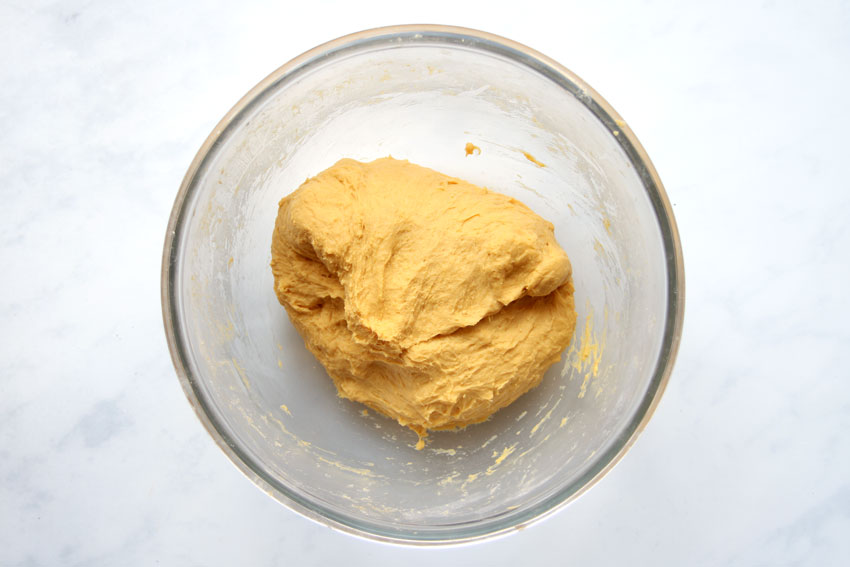
For the dough, combine 2 tablespoons (30 g) water, yeast, and sugar in a large bowl. Briefly stir. Stir in 1 ¼ cups (300 g) pumpkin purée, salt, and melted butter.
Add half of the flour to the bowl and mix until combined, then add the rest of the flour. Mix and knead (knead by hand, or use a stand mixer with a dough hook) to make a soft and smooth dough that is slightly sticky, about 5-10 minutes.
Depending on the pumpkin purées water content, the dough consistency can vary. If the dough is too tacky and impossible to knead by hand, add a bit additional flour. When kneading the dough (by hand or machine) the dough should be forming a ball and clearing the sides of the bowl towards the end of the kneading time. It should be soft and elastic.
Place dough in a lightly greased bowl, and let it rise at warm room temperature until doubled (or almost doubled) in volume, about 1 hour.
In the meantime, butter a 10-inch (26 cm) springform pan or round cake pan or line with parchment paper. Alternatively, use a 9-inch square pan.
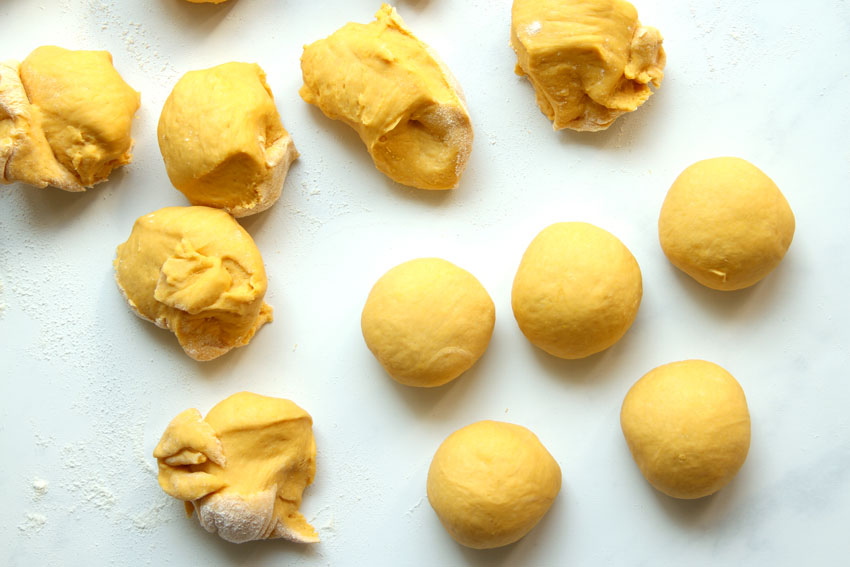
Transfer the dough to an unfloured or only slightly floured work surface and divide into 15 equal pieces (16 if using the square pan). Shape each piece into a smooth ball.
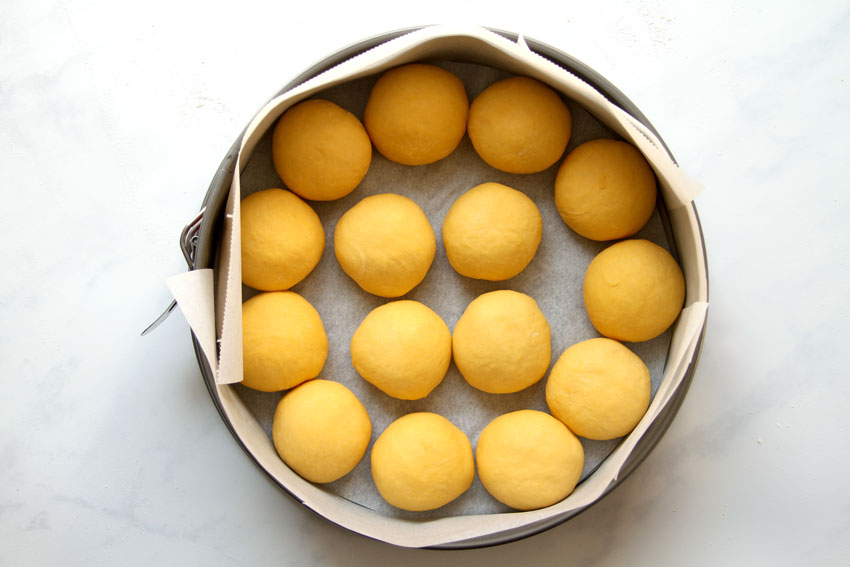
Space the rolls in the pan. Tip: For make-ahead option, put the pan in the fridge now, see note in recipe part below.
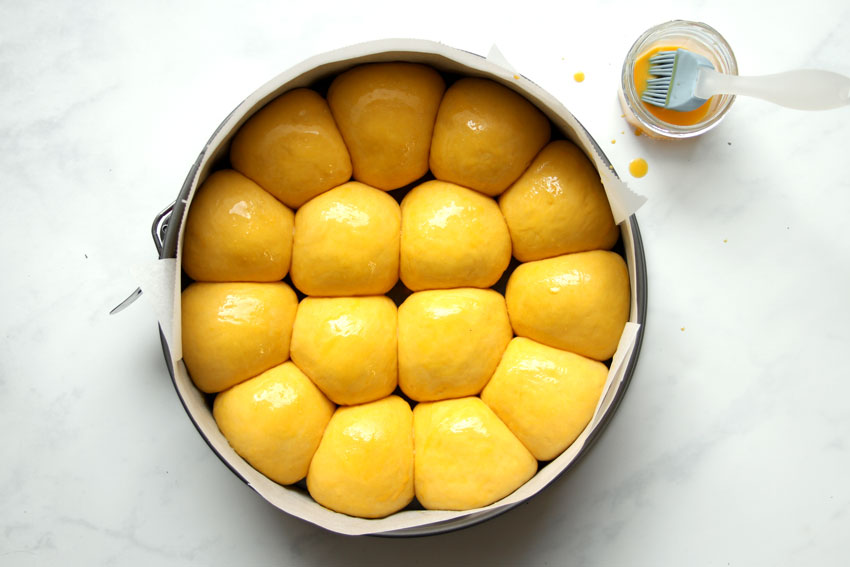
Cover the pan with a towel, and allow the rolls to rise at warm room temperature until puffy, about 1/2 hour. Towards the end of the rising time, preheat the oven to 350 °F (180 °C).
For the egg-wash, mix egg yolk and milk in a small bowl and gently brush the rolls.
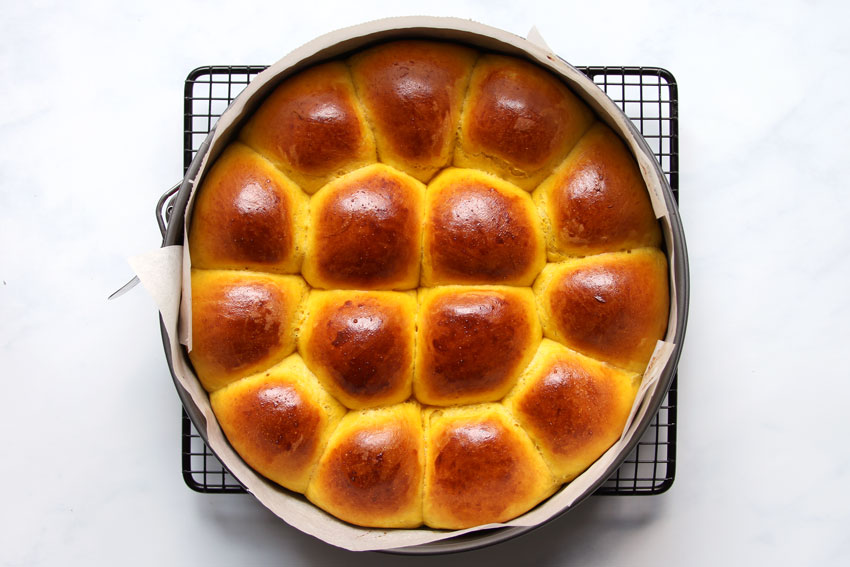
Bake them on the center rack until golden brown, about 20 minutes.
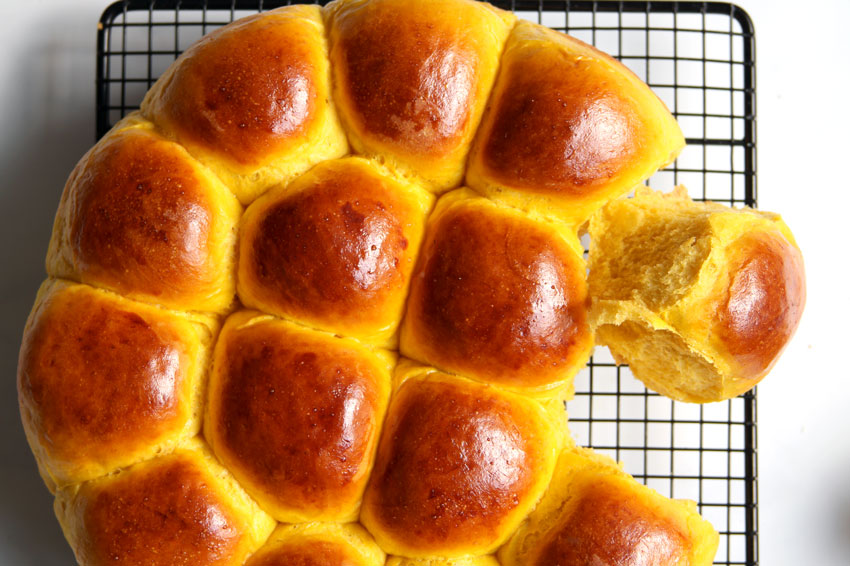
Let cool slightly and enjoy!
A simple and easy recipe for soft, light, and fluffy pumpkin dinner rolls with homemade pumpkin purée. Make ahead or bake immediately. You’ll need just a handful of ingredients!
Recipe: Ursula | lilvienna.com
Ingredients
- 1 pound butternut squash (for canned pumpkin purée, see note)
- 1 tablespoon sugar (see note)
- 2 ¼ teaspoons (7 g) instant yeast or active dry yeast
- 3/4 teaspoon (4 g) fine salt
- 2 tablespoons (30 g) melted butter
- 3 ¼ cups (420 g) bread flour (all-purpose flour works too)
- 1 egg yolk
- 1 tablespoon milk
Instructions
- For the pumpkin purée:
- Cut the pumpkin in half, and scoop out the seeds and the stringy pulp. Peel and chop pumpkin into 1-1.5 inch (or 2-3 cm) pieces.
- Add enough water to cover the bottom of a large saucepan by 1-inch (2-3 cm). Add chopped pumpkin into the saucepan and cook covered over low heat until tender, about 20 minutes. Alternatively, you can steam the pumpkin until soft using a steamer basket.
- Drain pumpkin and blend until smooth using a food processor or hand blender. Let cool slightly.
- For the dough:
- Combine 2 tablespoons (30 g) water, yeast, and sugar in a large bowl. Briefly stir.
- Stir in 1 ¼ cups (300 g) pumpkin purée, salt, and melted butter.
- Add half of the flour to the bowl and mix until combined, then add the rest of the flour. Mix and knead (knead by hand, or use a stand mixer with a dough hook) to make a soft and smooth dough that is slightly sticky, about 5-10 minutes. Depending on the pumpkin purées water content, the dough consistency can vary. If the dough is too tacky and impossible to knead by hand, add a bit additional flour. When kneading the dough (by hand or machine) the dough should be forming a ball and clearing the sides of the bowl towards the end of the kneading time. It should be soft and elastic.
- Place dough in a lightly greased bowl, and let it rise at warm room temperature until doubled (or almost doubled) in volume, about 1 hour.
- In the meantime, butter a 10-inch (26 cm) springform pan or round cake pan or line with parchment paper. Alternatively, use a 9-inch square pan.
- Transfer the dough to an unfloured or only slightly floured work surface and divide into 15 equal pieces (16 if using the square pan). Shape each piece into a smooth ball and space the rolls in the pan. [For make-ahead option, put in the fridge now, see note.]
- Cover the pan with a towel, and allow the rolls to rise at warm room temperature until puffy, about 1/2 hour. Towards the end of the rising time, preheat the oven to 350 °F (180 °C).
- For the egg-wash, mix egg yolk and milk in a small bowl and gently brush the rolls. Bake them on the center rack until golden brown, about 20 minutes. Let cool slightly and enjoy!
Notes
Pumpkin: I used a 2 pound (1 kg) butternut squash in this recipe, which made about 2 ¾ cups (650 g) of pumpkin purée. You’ll roughly need 1 pound (450-500 g) of fresh pumpkin to get the 1 ¼ cups (300 g) the recipe calls for. You can substitute 1 ¼ cups canned pumpkin purée (plain, without spices). If you do so, add the flour gradually until you get a slightly sticky yet workable dough. Because homemade pumpkin purée is usually more watery, you might not need all the flour. Feel free to use other pumpkin varieties – I also like Hokkaido pumpkin a lot.
Sugar: I prefer dinner rolls with a moderately sweet taste, so I only add 1 tablespoon sugar. The pumpkin purée adds a little sweetness too. If you prefer them sweet-ish, add 3 tablespoons sugar in total. Light brown sugar is a good substitute for granulated white sugar.
Make ahead: To make the dinner rolls a day ahead of time, put the pan in the fridge after shaping the rolls. Cover the pan tightly and let the rolls rise in the fridge (about 12 hours). If they have not puffed up during the time in the fridge, let them rise, covered, at warm room temperature. If you want to speed up the process, put them in the warm oven (max. 125 °F / 50 °C). When nice and puffy, brush with egg wash and bake according to the recipe. The ready baked rolls also freeze well. Let cool entirely before freezing.

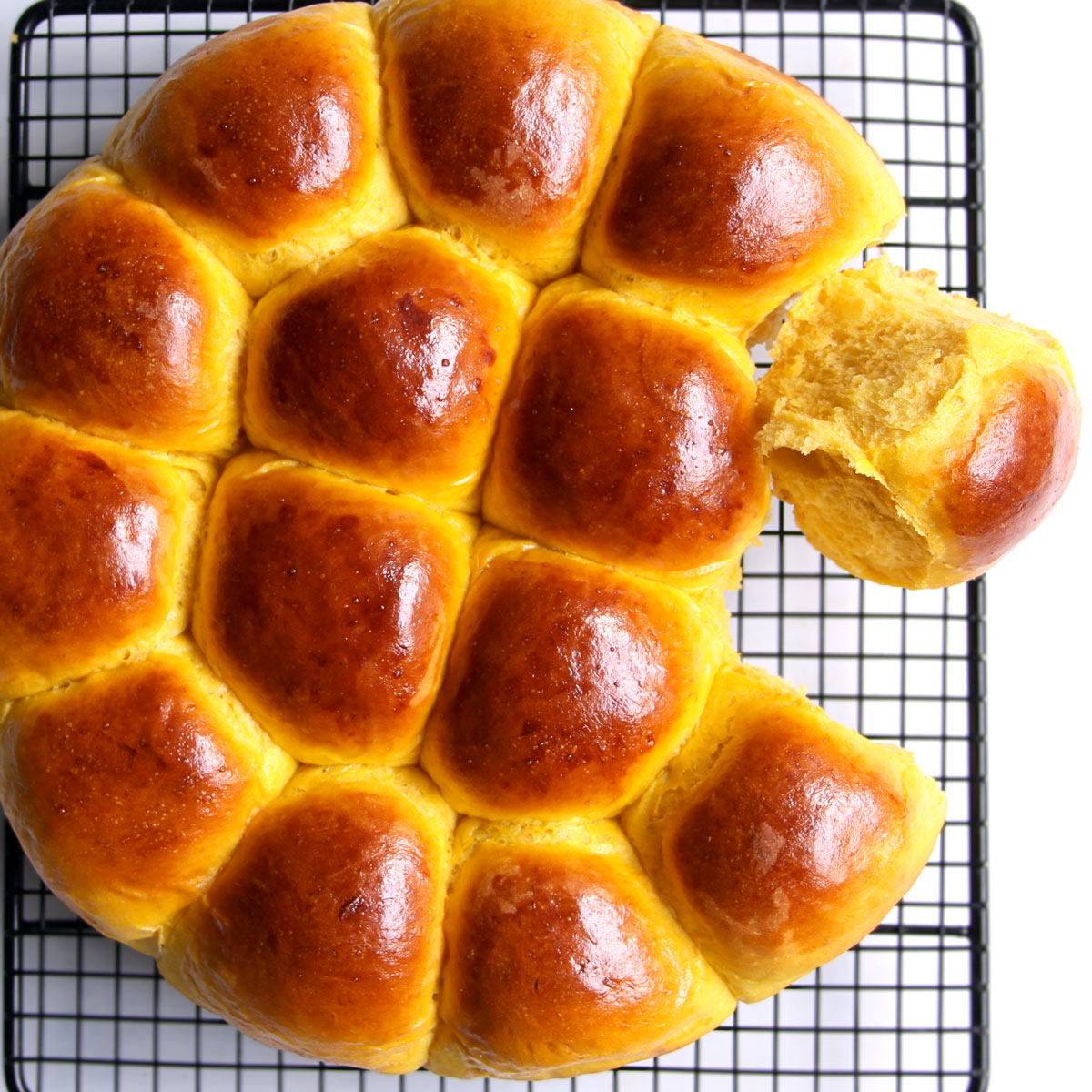
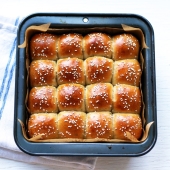
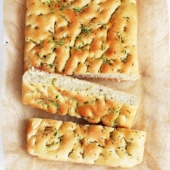
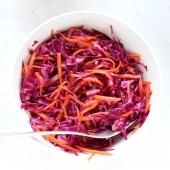
Hi,
I made the pumpkin dinner rolls with a long, cold bulk rise overnight. Shaped them the next morning, second rise, then baked them. Everybody loved them and they were literally gone in an hour! I will make them again for Christmas brunch with the family. Thanks for the great recipe. Anne
Hi Anne,
Happy to hear that everybody liked them. I know, they always go so quickly. A double batch is never wrong ;-) Thanks so much for your comment, really appreciate it! Ursula
Hi,
They turned out perfectly fluffy and I love the taste (not sweet). Thank you!
Hi Lori,
So happy that the dinner rolls turned out great! Thanks so much for trying the recipe and leaving a comment. Hope you’ll make them again some day :), Ursula
Really Helpful! Thanks for the blog!